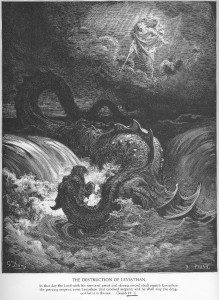
Well, the end is upon us. It’s the end of the world/New Testament as we know it, and I feel fine.
Sometime in the next week, I’ll be putting up a post about what to read for the Book of Mormon, as I did for the New Testament and Old Testament. I’ll also have a significant announcement about me and the blog, but right now, I do plan on doing regular, but short Book of Mormon posts, to start before the new year, so I’m ahead of things.
Today’s chapters… today’s chapters, well. Let’s be blunt. If you pick up a commentary from a believing scholar who has spent his/her entire life studying Revelation, they are likely to admit that no one has any real clue. Just about every passage is disputed in some way by somebody. I am skeptical of the lesson manual’s ability to navigate us through this material, and I’m not about to hold myself out as any expert. Revelation to me is like Isaiah in the Old Testament; I’ve just never really had any interest. So, apologies to anyone who came to today’s post looking for the keys to unlock the universe. These chapters contain a lot of things that sound familiar, and a lot of things that sound crazy. Be prepared for lots of potentially crazy comments and wild doctrinal inferences. This is fertile ground.
True to form, I’ll provide a few observations.
These chapters build heavily on the Old Testament, and the better one knows the Old, the easier this is to understand. Or if not understand, at least catch the references. Take, for example, Gog and Magog.These are two names for the same group/country/city, which comes out of Ezekiel 38-39. Technically, Gog is the leader of Magog (Eze 38:2). God/Magog was to “come out of the remotest parts of the north” to Israel, according to Eze 38:14-15. Now, given that east of Israel was a desert, and west was an ocean, attacking armies could come either from the south via Egypt, or the north. And whenever Egypt wanted to attack Babylon/Assyria or vice-versa, they had to tramp right through Israel to get there. So saying “out of the north” isn’t code for “Europe” or “Russia” or anything like that. It just means “not from the south.”
Another way Revelation reflects the Old Testament is an uncomfortable one, as many are aware, once they read it, Revelation describes war, bloodshed, endless fire, brimstone, and sulphur, destruction, pestilence, death. And much of this is poured out by God himself on humanity. In the Old Testament, God is a “man of war” (Exo 15:3) a “passionate, avenging God; The LORD is vengeful and fierce in wrath. The LORD takes vengeance on His enemies, He rages against His foes.” (Nah 1:2). This is the stereotype of “the old testament god.” But the Old Testament also describes him as “a God merciful and gracious, slow to anger, and abounding in steadfast love and faithfulness,keeping steadfast love for the thousandth generation, forgiving iniquity and transgression and sin, yet by no means clearing the guilty…” (Exo 34:6-7). If he does indeed, “visit the sins of the parents” upon their children to the third or fourth generation, note that his grace is 250x times that, “showing grace to the thousandth generation.” Eze 18:23 and Eze 33:11 make clear that God takes no pleasure in the death of the wicked. So, we can’t make simplistic generalizations about the “Old Testament God” vs. the “New Testament God,” unless we cheat and cherry-pick passages. The latter is not all warm and fuzzy, nor is the former all Mad Max death-and-destruction all the time.
In any case, while Revelation largely depicts God in his “man of war” guise, it also reflects the Old Testament in the other direction as well. Revelation 21:3 (cf. Rev 7:17) reads “And I heard a loud voice from the throne saying, “See, the home of God is among mortals. He will dwell with them; they will be his peoples, and God himself will be with them; he will wipe every tear from their eyes. Death will be no more; mourning and crying and pain will be no more, for the first things have passed away.” This is a quotation/allusion to Isaiah 25:8-9,
On this mountain the LORD of hosts will make for all peoples a feast of rich food, a feast of well-aged wines, of rich food filled with marrow, of well-aged wines strained clear.
7 And he will destroy on this mountain the shroud that is cast over all peoples, the sheet that is spread over all nations;
8 he will swallow up death forever. Then the Lord GOD will wipe away the tears from all faces, and the disgrace of his people he will take away from all the earth, for the LORD has spoken.
9 It will be said on that day, Lo, this is our God; we have waited for him, so that he might save us. This is the LORD for whom we have waited; let us be glad and rejoice in his salvation.
That’s a fantastic eschatological passage. (Let’s ignore that in the next verses, they praise God for destroying their threatening neighbors the Moabites.) Ultimately, the enemies we want God to fight, to destroy and win, are enemies we cannot fight ourselves, namely, death, hell, and sin. God quite literally fights these in Revelation. (Remember, it’s apocalpyse, so Death and Hades/Hell can be personified as a dragon, and thrown into a lake of fire in Rev 20:14.) Indeed, this again echoes and expands on the Old Testament, with the cosmic battle at creation, God vs. the waters, the sea, leviathan/Rahab. It’s no surprise that the early Book of Mormon prophets know this Israelite tradition, e.g. “O the greatness of the mercy of our God, the Holy One of Israel! For he delivereth his saints from that awful monster the devil, and death, and hell, and that lake of fire and brimstone, which is endless torment.” 2Ne 9:19 (See
here.) It is God the divine warrior who fights that battle, and in an ironic twist, wins by losing, by allowing himself to be killed.
Anyway.
One other tidbit you might find interesting. You could structure the whole lesson around the idea of continuing revelation and line upon line using Rev 22:8-9 and my very old post/paper here.
Merry Christmas, and remember to do your holiday shopping through my Amazon link! Or you can donate directly here.
You can get updates by email whenever a post goes up (subscription box on the right). If you friend me on Facebook, please drop me a note telling me you’re a reader.











